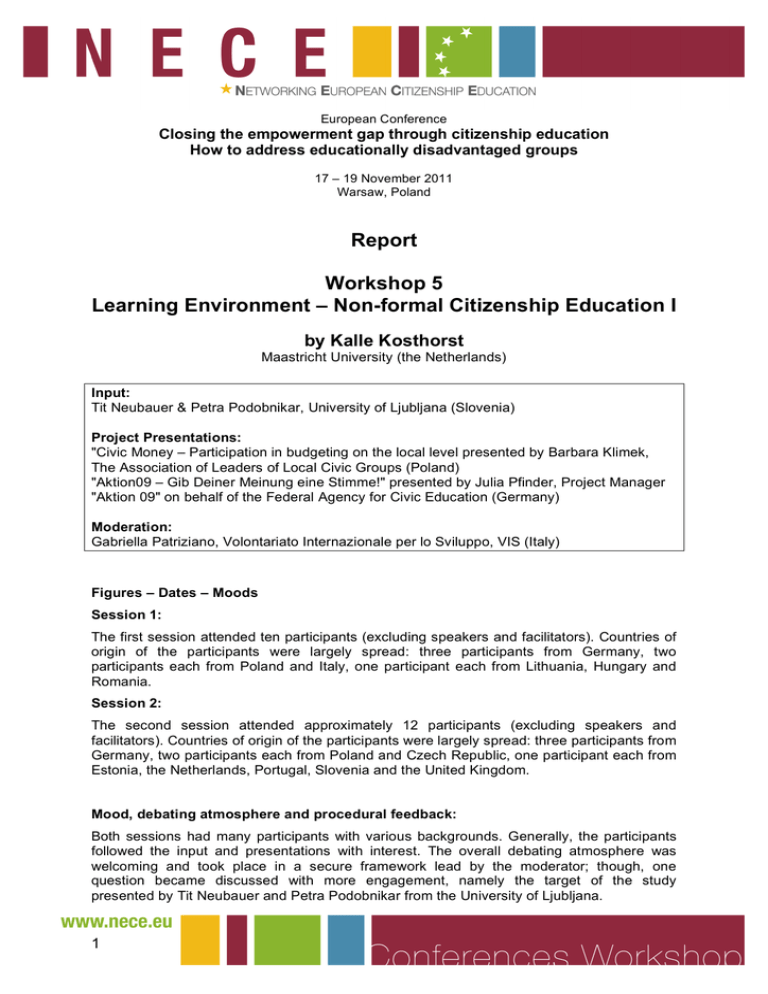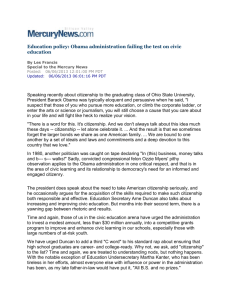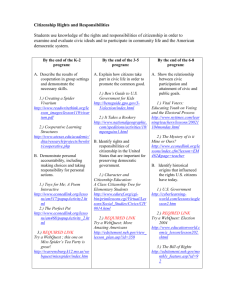Closing the empowerment gap through citizenship education
advertisement

European Conference Closing the empowerment gap through citizenship education How to address educationally disadvantaged groups 17 – 19 November 2011 Warsaw, Poland Report Workshop 5 Learning Environment – Non-formal Citizenship Education I by Kalle Kosthorst Maastricht University (the Netherlands) Input: Tit Neubauer & Petra Podobnikar, University of Ljubljana (Slovenia) Project Presentations: "Civic Money – Participation in budgeting on the local level presented by Barbara Klimek, The Association of Leaders of Local Civic Groups (Poland) "Aktion09 – Gib Deiner Meinung eine Stimme!" presented by Julia Pfinder, Project Manager "Aktion 09" on behalf of the Federal Agency for Civic Education (Germany) Moderation: Gabriella Patriziano, Volontariato Internazionale per lo Sviluppo, VIS (Italy) Figures – Dates – Moods Session 1: The first session attended ten participants (excluding speakers and facilitators). Countries of origin of the participants were largely spread: three participants from Germany, two participants each from Poland and Italy, one participant each from Lithuania, Hungary and Romania. Session 2: The second session attended approximately 12 participants (excluding speakers and facilitators). Countries of origin of the participants were largely spread: three participants from Germany, two participants each from Poland and Czech Republic, one participant each from Estonia, the Netherlands, Portugal, Slovenia and the United Kingdom. Mood, debating atmosphere and procedural feedback: Both sessions had many participants with various backgrounds. Generally, the participants followed the input and presentations with interest. The overall debating atmosphere was welcoming and took place in a secure framework lead by the moderator; though, one question became discussed with more engagement, namely the target of the study presented by Tit Neubauer and Petra Podobnikar from the University of Ljubljana. 1 Due to the feedback of the participants in the first session, it was decided to change the procedure. In the second session, the question-answer part was following every single presentation in order to discuss more structured and closer to the received information. Content The moderator shortly introduced the workshop team consisting of the moderator, the rapporteur, the input providers and the presenters. Afterwards, the moderator gave the topical question “how citizenship education can close the gap?” and handed the word over to the participants to let them introduce themselves. In both sessions this main question was further elaborated by the participants after Tit Neubauer`s and Petra Podobnikar`s (University of Ljubljana) presentation. Input The research project “Analyzing Citizenship Education of vulnerable groups” was a large citizenship education project conducted in Slovenia, which followed four steps. The project was not directly targeted at educationally disadvantaged groups but identified education as the most important factor besides other factors in relation to vulnerable groups. The concept “Citizenship Education” itself was identified as being highly exclusive as formal education settings reflect a norm of a “true citizen representing a predefined identity”. To meet this problem, the researchers proposed a bottom-up approach in non-formal education settings, which defines citizenship education by the socio-political context of the learners and engage methods of cyclical learning. In the following, two concrete good practices were described. The first project was “Café Open”, a bar set up by the LGBTIQ (Lesbian, Gay, Bisexual, Transgender, Intersex and Questioning) community to provide a space of freedom for the performance of political and cultural events and to address personal stories and opinions openly. Sensibilization and “public awareness raising” were identified as main goals. The second project was “Invisible workers of the world”, a self-organised formation, which acts solely through a website and which is not linked to other societal actors. Their topic is the every-day reality of migrant workers in Slovenia and beyond, the exchange of information concerning workers rights and “public awareness raising” towards a more inclusive society. As key effect of the study, it was stated the need for empowerment, inclusion strategies, policies and practices addressing discrimination as well as the combination of the provision of skills and competences with real political activism or at least political literacy. In the following debate, the question of accessibility of the “Café Open” for people beyond the LGBTIQ community was raised and in which form the “Invisible workers of the world” are organized. It was replied that “Café Open” is not exclusive and that those interested can participate. Regarding “Invisible workers of the world” it was replied in an intensive bi-lateral discussion that it does not follow any structure but is a website to exchange without the involvement of citizenship educators. Project Presentation 1 Julia Pfinder is a freelance project manager in the field of civic education and participation and is currently coordinating the network “Verstärker: Netzwerk zielgruppenspezifische Bildungsarbeit”. In 2009, she managed the youth participation project "Aktion09”. 2 The project took place in Germany during the "Superwahljahr 2009". With the aim to promote political participation, 60 young people between 15 and 25 from socially disadvantaged groups from all-over Germany were trained as peer-educators enabling them to implement own political projects and to reach further 1000 disadvantaged people in their communities. For the success of the project, it was necessary to entrust young people with responsibility and to provide educators for support, if needed. The training followed three targets: the provision of social and communicative skills, the provision of thematic knowledge on political participation and the provision of methodology on how to promote projects. To show the influence on reaching educationally disadvantaged target groups and the contribution of citizen education, Julia Pfinder let the young people speak themselves through a movie. Different activities like a music battle, street actions and panels with politicians showed the external impact of the project. In interviews, the participants of the project stated e.g. “many of us had an opinion – but we were not active” or “I have learned to be self-confident and to start-up a project”. Nevertheless, the presenter admitted that as the choice of participants was made by the sending institutions not every participant necessarily belonged to the most educationally disadvantaged group of young people. Furthermore, Julia Pfinder advised to conduct this project on small-scale level to reduce costs and to plan the project for a longer period of time (e.g. three years) to enable the young people to act independently. Moreover, a stronger focus in themes would lead to better synergies between the projects. Project Presentation 2 Barbara Klimek is a civic activist and trainer interested in civic participation and social inclusion. Since 2007, she is member of The Association Leader of Local Civic Groups. Besides, she has been working within the programme “Civic Money - Participation in budgeting on the local level” throughout the last three years which aims at supporting people and institutions working with the Solecki Fund. The project started in 2009 and is about to end in the near future. With the aim to support inhabitants of rural communities who are traditionally passive and excluded from civic activities, the project provides knowledge on how they can apply “local budgeting” in the framework of the Solecki Fund and come to decisions on project ideas on local level which are binding for the local government. For the success of the project, it was necessary to convince inhabitants that their participation can change things and to convince local authorities of the added value though inhabitants might argue with each other. To entrust the inhabitants to learn by doing, to discuss and to make decisions on how the public money should be spent was an important precondition. The training followed the target to provide residents and local leaders with knowledge on law, civic rights, local authorities duties and local budget. Problems mentioned were the age limit of 18 years to participate in the final decision; thus, to reach educationally disadvantaged people by providing them with the meaningful tool of a binding expression of opinion can only happen after the year of 18, excluding a substantial part of the citizenry from participation. Nevertheless, as the Solecki Fund is implemented in national law, every citizen can refer to his/her Solectwo and ask for its application. Therefore, it can be potentially applied everywhere in Poland and thus contribute to citizenship education via learning-by-doing. Not least, local governments get money back from state government if they successfully apply the Solecki Fund mechanism. Another finding was that the contrary to the formal local government, in the project itself generally many more women then men participate. 3 Findings To secure findings, a rapporteur was set in to document the input, the presentations and the contributions made by the participants. Furthermore, the input providers and the presenters used a slide presentation in order to show and to secure their findings. Moreover, it was a successful good practice that the workshops were held twice in order to provide the opportunity to a wide range of people to respond to the presentations improving the overall outcome and reach of the workshop. The main findings can be summarized as follows. The main finding of the input was that formal citizenship education is not able to reflect the different needs and purposes of the “real” citizens, but imposes a highly exclusive norm of rights and duties to be followed by “true” citizens. To solve this problem, it was argued in favour of a non-formal citizenship education approach which takes into account the needs and background of the learners instead of imposing a highly exclusive norm. Therefore, a non-formal citizenship education approach is characterized by empowerment of the learners, by a highly inclusive approach addressing problems of discrimination in the local environment and providing skills and competences setting the basis for real political activism. Both projects presented were highly relevant for the workshop as they successfully reflect the essential aspects identified of non-formal citizenship education. Furthermore, both projects can be easily transferred to other contexts and legal situations and do not require excessive financial resources, if applied locally. Both projects follow the idea of empowerment of citizens by enabling them to name problems in their local environment and to provide them with a learning framework to acquire the necessary knowledge and skills to respond to their problems. Moreover, in both projects the principle of peer-education plays a significant role as actors of non-formal education do not have the possibility to reach every citizen directly due to limited amount of resources and the principle of voluntariness. Concerning the target group, it needs to be considered in how far a more inclusive approach can be achieved in non-formal citizenship education - not restricted to young people, nor only to those beyond the age of 18. In the upcoming years, these aspects might receive more attention with regard to the demographic change and the promotion of inclusive direct democratic elements, which are accessible for every citizen in society. 4






